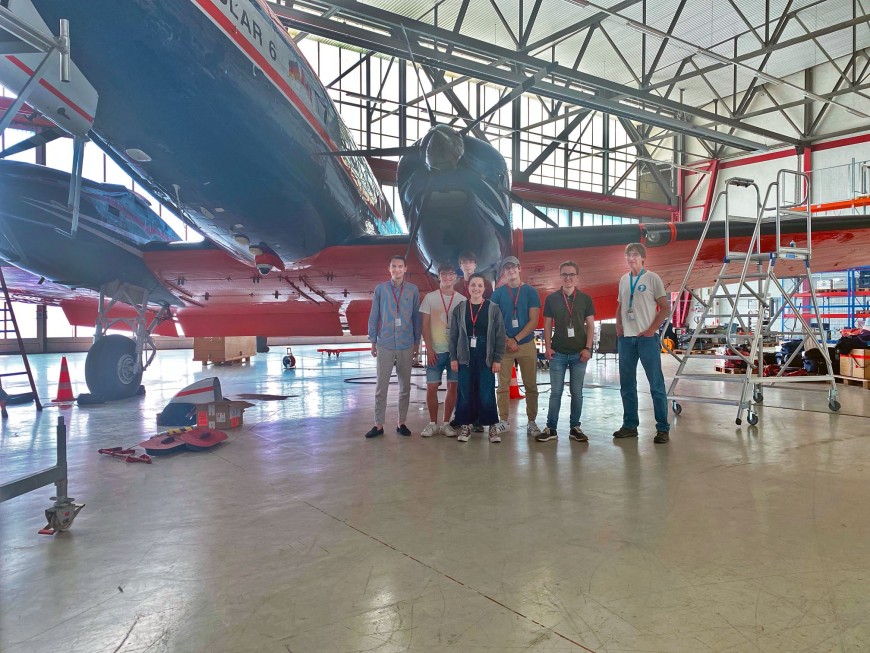From campus to the Arctic
Results from a lab course organized by the Systems group are supporting polar research
2024/04/16 by Dr. Benjamin Hättasch
The Alfred Wegener Institute Helmholtz Centre for Polar and Marine Research (AWI) operates aircraft to explore the Arctic and Antarctic. Students of computer science and cognitive science have developed software in the software development project as part of their bachelor's degree programme at TU Darmstadt that will make it easier to plan these flights in future.

The curriculum for the Bachelor of Science in Computer Science and the Bachelor of Science in Cognitive Science includes the “Software Development Team Project” (previously the Bachelor-Praktikum). This course is jointly ogranized by the Systems Group and the UKP Lab. Students learn and practise the entire software development process in small groups of four to five people on specific projects. The groups are supervised by instructors from the entire university, with each group working on a different topic.
One of these topics in the winter semester 2022/23 was the Science Flight Planner, in which students Leon Krüger, Lars Reining, Jonas Schröter, Moritz Vogel and Hannah Willkomm developed a plugin for the free geo-information system QGIS. This now makes it possible to plan flight routes for scientific exploration flights more easily and efficiently. The software is used to plan the AWI's Polar 5 and 6 flights and is also available as open source software for everyone to download and use free of charge.
Selecting a suitable flight route for an exploration aircraft is a complex problem. In the short and expensive flight time, as many points of interest as possible should be flown over and recorded by the sensors on board the aircraft. It is not enough to simply fly over grids; very complex routes may be required, for example to follow the winding flow line of a glacier.
The software must therefore standardise and sort various interesting flight destinations such as crack lines and output them as a usable flight plan. In addition, care must be taken to ensure that all relevant areas can be correctly detected by the sensors on board the aircraft, in some cases with a specified overlap. Such planning must also work without an internet connection in a tent somewhere in the eternal ice so that the route for the next day can be adjusted after the results of one day's flight have been quickly analysed.
In other words, the students had to take many requirements into account. A modern software development process is practised in the course: Students have to determine the requirements for software in dialogue with the client, develop a suitable software design and implement it. This takes place in an iterative process over the course of an entire semester.
The group was supervised by the Scientific Computing Lab and Prof Angelika Humbert. She is a professor at the University of Bremen, heads a working group on modelling and remote sensing of ice sheets at the AWI and is a lecturer at TU Darmstadt. There she gives a lecture on the mechanics of glaciers and ice sheets every winter semester.
Prof Humbert was very impressed by the collaboration with the student group. In addition to the productive collaboration and the students' great interest in familiarising themselves with their topic and developing useful software, she particularly praised the quality assurance measures. These are an integral part of the course. To ensure that the software is actually useful and usable for domain scientists in the end, the group conducted a broad-based usage study with researchers from various groups across Germany. A help function and an explanatory video were also implemented.
Through the combination of an agile software design and development process, suitable quality assurance measures and good documentation of the results produced, the students not only learnt a great deal and gained practical insights, but also created software that can help to obtain new scientific results.
At the invitation of the AWI, the students and their student team supervisor Tobias Tiebes were able to view one of the polar aircraft in the hangar in Bremen in June. The software is currently being used to plan the flights of Polar 6 in Canada and to prepare a helicopter mission in Greenland.
Team project software development
The software development team project is a software project for Bachelor's students of computer science.
Students experience and learn the systematic realisation of a non-trivial software project in a group of 4-5 people.
The projects are offered by TU employees and are chosen and worked on by the students. The resulting software should be useful for research, teaching or everyday university life.
The course is organised jointly by the Systems Group and the UKP Lab every winter semester.


